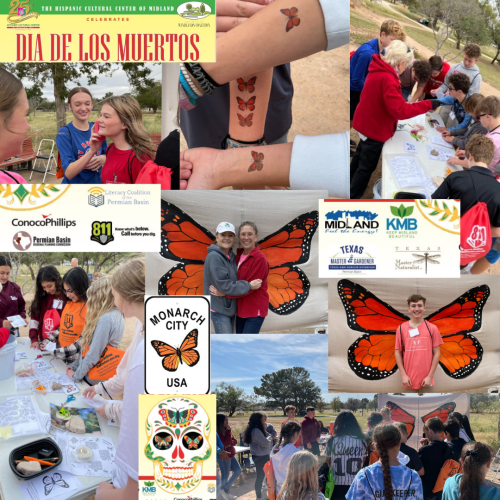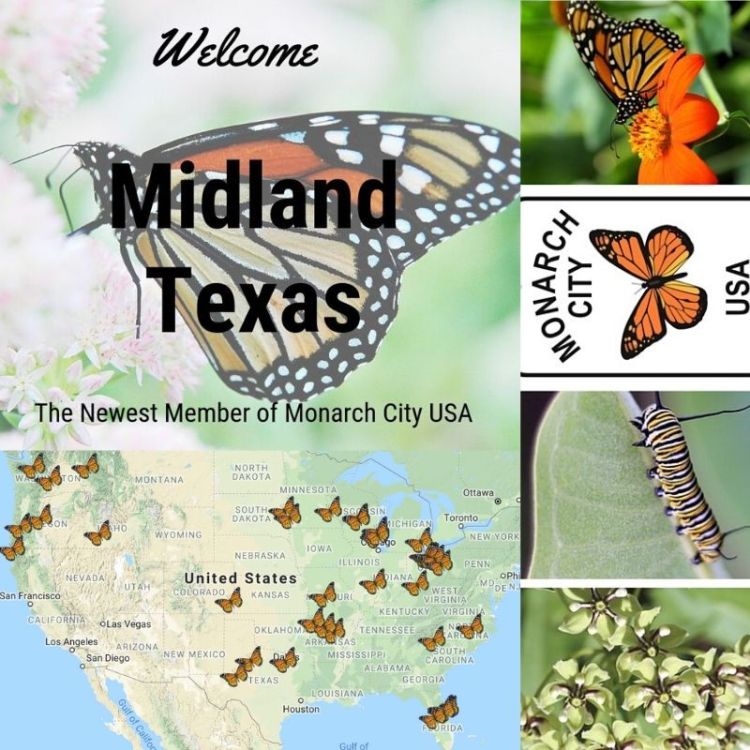Monarch City
Midland is one of seven cities, currently, in the state of Texas to be recognized as a Monarch City. We are working hard with the City of Midland to bring projects with Monarchs in mind.
What do Monarch need? A safe place to migrate through!
- They need food, shelter, and water for each stage of life.
- Each stage of the life cycle has different needs.
- Eggs and caterpillars must have Milkweed to survive. Texas Milkweeds and Monarchs · iNaturalist
- Two native milkweeds for West Texas: Asclepias asperula (Antelopehorns) and Asclepias oenotheroides (Zizotes)
- Adult monarchs need a variety of nectar plants to fuel their migration from Mexico to Canada in the spring and fall.
- Native nectar plants for include: Helianthus (common roadside sunflowers) , Gaillardia, Verbesina encelioides, Salvia farinacea
You can help by creating habitats!
- Plant native flowers
- protect native milkweed
- create a shallow and clean water source
- Limit use of pesticides
- Turn off outdoor lights at night
- Support a Monarch conservation group.

More Resources
- Homepage | Pollinator.org
- How to Plant Texas Native Milkweed
- Pollinators (usda.gov)
- Gardening for Pollinators (usda.gov)
- Monarch Butterfly Conservation | Xerces Society
- Monarch Butterflies (journeynorth.org)
- Monarch Watch
- Monarch Butterfly and Other Insect Pollinators- Texas Nature Trackers - Wildlife Diversity Program - Texas Parks & Wildlife Department
- Texas Native Seeds Resource-Native American Seeds
Powerful Pollinators
While pollinators come in all different shapes and sizes, the most proficient pollinators are bees. Did you know that honey bees are not native to North America? They were brought over in the 1600's because North America native bees didn't produce the honey that honey bees do.
Over 800 different species of native bees have been identified in just Texas. Most of these bees tend to be solitary which means they don't have hives like a honey bee colony does. We do have some species that are colony-minded. Any of the nine different bumble bees that are native to Texas are colony-minded. Texas Parks & Wildlife has a great guide to identifying which bumble bee you might be looking at. The difference between bumble bee colonies and honey bee colonies is that a bumble bee colony only lasts a season, whereas a honey bee colony can last several years. Bumble bee colonies start off in the spring and last just until winter when the queen goes into hibernation.
According to the USDA Forest Service, butterflies, moths, even wasps, some flies, some beetles, even one type of mosquito, birds and bats. There are eight species of butterflies that recognized as pollinators and four species of moths. The wasps that are considered pollinators include the paper wasp, yellow jacket, and sphecidae wasp. Hummingbirds are the most common bird species that is a pollinator. The lesser long-nosed bat and the Mexican long-tongued bat, drink nectar from flowers, and act as pollinators along the way.
Pollinator Importance
In the US alone, pollinators have an impact of over 10 BILLION dollars every year. Globally, it is estimated that they impact over 3 TRILLION dollars. Almost 80% of all of our food and plant-based industrial products require pollination by animals. When bees and other pollinators visit our food crops, the produce tends to be larger and more flavorful.
- More than half of the world’s diet of fats and oils come from animal-pollinated plants (oil palm, canola, sunflowers, etc.).
- More than 150 food crops in the U.S. depend on pollinators, including almost all fruit and grain crops.
- The USDA estimated that crops dependent on pollination are worth more than $10 billion per year. -Pollinators | USDA
Helping Pollinators
Pollinators are very important to the life we lead so we need to make sure we do what we can to help them out. Here are some of the simple ways you can help out and still maintain a beautiful home and garden.
- Plant native species that will bloom different parts of spring, summer, and fall. Pollinators need food during spring, summer and fall and by providing plants that will allow them to gather pollen and nectar, you are keeping those pollinators happy and healthy.
- Try to minimize the use of all pesticides, even organic ones. If you must use a pesticide, choose one with the lowest risk to bees and other pollinators. Check that label and then make sure you spray in the evening after they have stopped flying.
- Water your pollinators! A shallow basin of water set on the ground with some gravel give a place for pollinators to rest while quenching their thirst. Butterflies and some bees, prefer a mud puddle so you can let a hose or faucet drip just a bit to form a damp, muddy sipping spot. If you add a bit of sea salt or wood ashes to the mud, you will add micronutrients and minerals to their diet.

